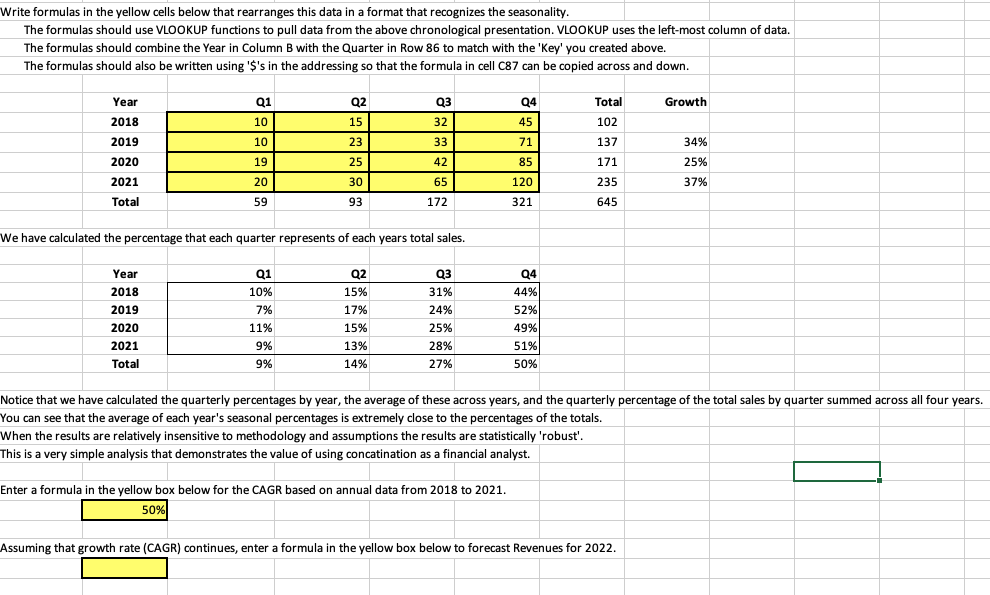Answered step by step
Verified Expert Solution
Question
1 Approved Answer
explanations would be great. thanks Write formulas in the yellow cells below that rearranges this data in a format that recognizes the seasonality. The formulas

explanations would be great. thanks
Write formulas in the yellow cells below that rearranges this data in a format that recognizes the seasonality. The formulas should use VLOOKUP functions to pull data from the above chronological presentation. VLOOKUP uses the left-most column of data. The formulas should combine the Year in Column B with the Quarter in Row 86 to match with the 'key' you created above. The formulas should also be written using '$'s in the addressing so that the formula in cell C87 can be copied across and down. Year Q1 Q3 04 Total Growth Q2 15 2018 10 32 102 45 71 2019 10 23 33 137 34% 19 25 42 85 171 25% 2020 2021 Total 20 30 65 235 37% 120 321 59 93 172 645 We have calculated the percentage that each quarter represents of each years total sales. Q3 Q1 10% 7% Year 2018 2019 2020 2021 Total Q2 15% 17% 15% 13% Q4 44% 52% 49% 51% % 50% 31% 24% 25% 28% 27% 11% 9% 9% 14% Notice that we have calculated the quarterly percentages by year, the average of these across years, and the quarterly percentage of the total sales by quarter summed across all four years. You can see that the average of each year's seasonal percentages is extremely close to the percentages of the totals. When the results are relatively insensitive to methodology and assumptions the results are statistically 'robust'. This is a very simple analysis that demonstrates the value of using concatination as a financial analyst. Enter a formula in the yellow box below for the CAGR based on annual data from 2018 to 2021. 50% Assuming that growth rate (CAGR) continues, enter a formula in the yellow box below to forecast Revenues for 2022. Write formulas in the yellow cells below that rearranges this data in a format that recognizes the seasonality. The formulas should use VLOOKUP functions to pull data from the above chronological presentation. VLOOKUP uses the left-most column of data. The formulas should combine the Year in Column B with the Quarter in Row 86 to match with the 'key' you created above. The formulas should also be written using '$'s in the addressing so that the formula in cell C87 can be copied across and down. Year Q1 Q3 04 Total Growth Q2 15 2018 10 32 102 45 71 2019 10 23 33 137 34% 19 25 42 85 171 25% 2020 2021 Total 20 30 65 235 37% 120 321 59 93 172 645 We have calculated the percentage that each quarter represents of each years total sales. Q3 Q1 10% 7% Year 2018 2019 2020 2021 Total Q2 15% 17% 15% 13% Q4 44% 52% 49% 51% % 50% 31% 24% 25% 28% 27% 11% 9% 9% 14% Notice that we have calculated the quarterly percentages by year, the average of these across years, and the quarterly percentage of the total sales by quarter summed across all four years. You can see that the average of each year's seasonal percentages is extremely close to the percentages of the totals. When the results are relatively insensitive to methodology and assumptions the results are statistically 'robust'. This is a very simple analysis that demonstrates the value of using concatination as a financial analyst. Enter a formula in the yellow box below for the CAGR based on annual data from 2018 to 2021. 50% Assuming that growth rate (CAGR) continues, enter a formula in the yellow box below to forecast Revenues for 2022Step by Step Solution
There are 3 Steps involved in it
Step: 1

Get Instant Access to Expert-Tailored Solutions
See step-by-step solutions with expert insights and AI powered tools for academic success
Step: 2

Step: 3

Ace Your Homework with AI
Get the answers you need in no time with our AI-driven, step-by-step assistance
Get Started


